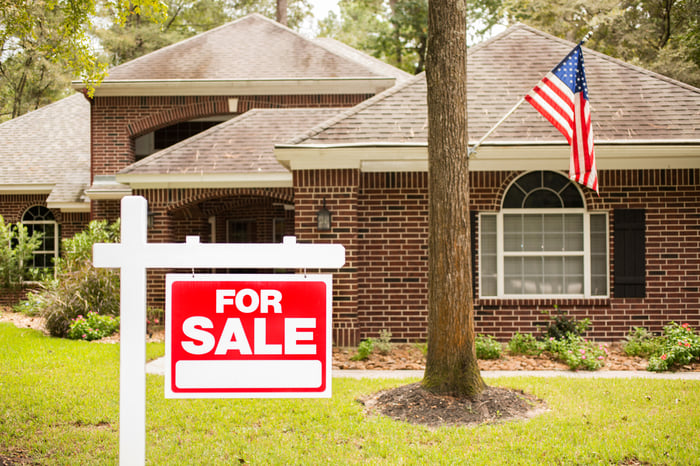Dating back to its early history, Opendoor Technologies (OPEN -2.58%), the leading online home flipper, is one of the worst-performing stocks in the market.
Shares have collapsed, as a business that worked during the real estate boom of the pandemic has gone bust amid soaring interest rates and a weak housing market. Homeowners who bought or refinanced at rock-bottom rates during the pandemic are reluctant to sell. The stock is down 96% from its peak in 2021.
Despite that history, the real estate stock caught fire in recent weeks, seemingly as part of a meme stock boom, as chatter around the stock has increased on Reddit's WallStreetBets Page and X.com. Remarkably, the stock is up 160%, even though there have been no noteworthy changes in the company's fundamental business.
An argument that the stock could be the next Carvana (CVNA -1.25%) -- which achieved a remarkable turnaround after recovering from near-bankruptcy in 2022 -- seems to have fueled the recent surge.

Image source: Getty Images.
The next Carvana?
In a post on WallStreetBets in May, one user laid out the case for why Opendoor could be the next Carvana.
They noted that Opendoor had similarly plunged, even though its balance sheet remained stable. The post noted that a change in strategy (pairing customers with agents instead of getting a quote directly), the potential tailwind from lower interest rates, its reductions in loss per transaction, and the impact of layoffs and other cost cuts could all lead to the company's recovery. Plus, factors like a high short interest could drive a short squeeze.
Overall, as the bull thesis goes, the stock has plenty of liquidity on the balance sheet to help it stay afloat and should be able to capitalize on lower interest rates. However, while you can craft a turnaround narrative around almost any beaten-down stock, the comparison to Carvana is flawed.
First, Opendoor has plunged not because of a bankruptcy threat, but because its business model seems fundamentally flawed to Wall Street. No one has successfully done home-flipping at scale before, and other competitors, such as Zillow and Redfin, bowed out of the iBuying competition because they were burning cash and didn't see a future in it.
Flipping a home is much different from selling used cars. Used cars have standard makes and models. Repairs, if needed, are typically straightforward, and cars can be transported to a central facility for repairs, as Carvana does. There's also a well-established business model for selling used cars, with thousands of used car lots across the country.
On the other hand, flipping a home is unique. You need to understand local housing markets, local zoning laws, and have connections to local contractors who can do any repairs the home might need. There's much more friction in selling a home than a car, not to mention the 6% commission that's typically part of a home sale.
What's more, Carvana had a long track record of sales growth, with 23 straight quarters of triple-digit revenue growth prior to the stock's collapse, driven by similar forces to Opendoor's, including rising interest rates and volatility in used car prices related to the pandemic and the 2022 supply chain crunch. The company also made a poorly timed acquisition of the ADESA car auction business.
Carvana was able to lower its costs and deliver steady gross profit in used car sales, and the stock benefited from a new bull market in 2023 and 2024.
Where Opendoor stands today
The factors that could drive a similar recovery for Opendoor still seem distant if not impossible. The pandemic-era housing market was unique in the real estate industry and is unlikely to be repeated. Mortgage rates fell to below 3%, and home demand was spurred by the need to adapt to new circumstances, which included needing more space to work and play from home, as well as an exodus from cities to warmer climates with outdoor space and room for social distancing.
As of its first quarter, the company generated $99 million in gross profit on $1.2 billion in revenue, while contribution profit, which includes other direct costs related to selling a home, was $54 million.
The company reported an adjusted net loss of $63 million, compared to a net loss of $80 million in the same year-ago quarter. It reported an adjusted earnings before interest, taxes, depreciation, and amortization (EBITDA) loss of $30 million, although it expects to deliver an adjusted EBITDA profit of $10 million to $20 million in the second quarter.
Overall, Opendoor's business appears to have stabilized, but it continues to lose money. Without a significant change in the housing market, it's hard to see the company mounting a significant turnaround. Tariffs are expected to raise prices and make interest cuts more difficult, putting more pressure on the company.
While the meme stock rally can drive Opendoor shares, the long-term outlook for the business remains troubling.





